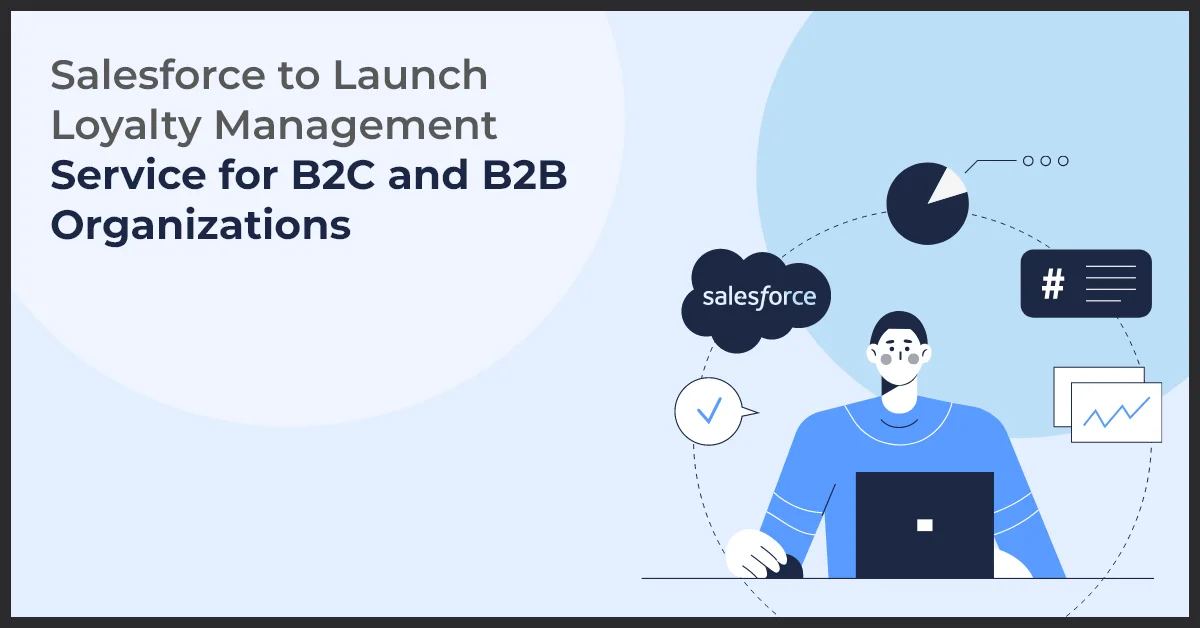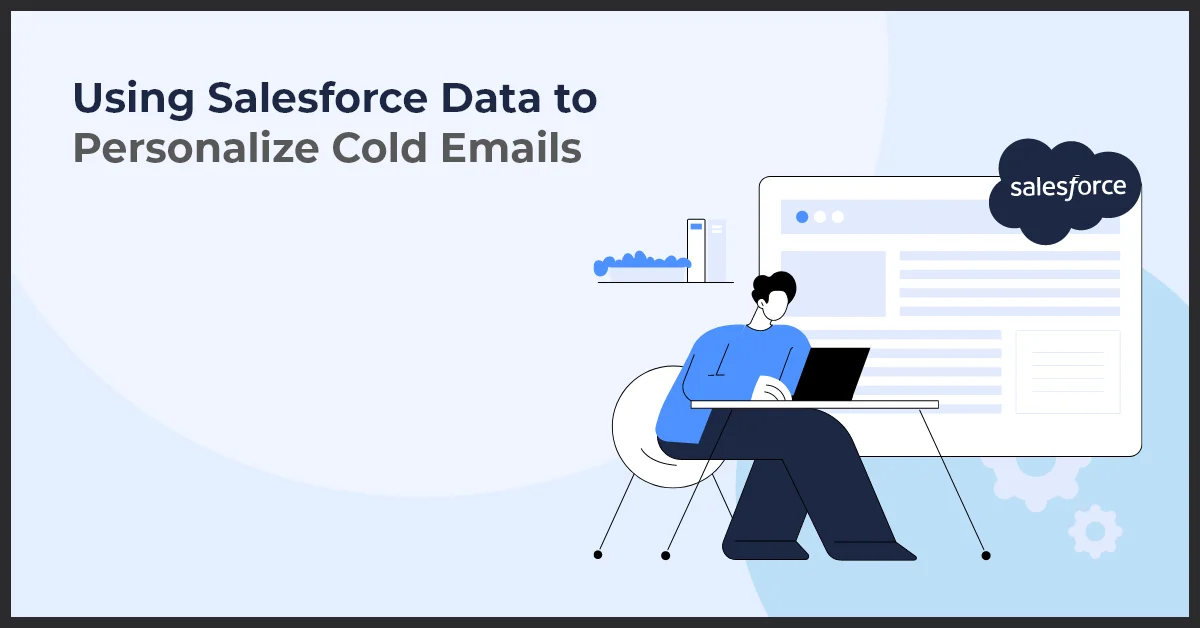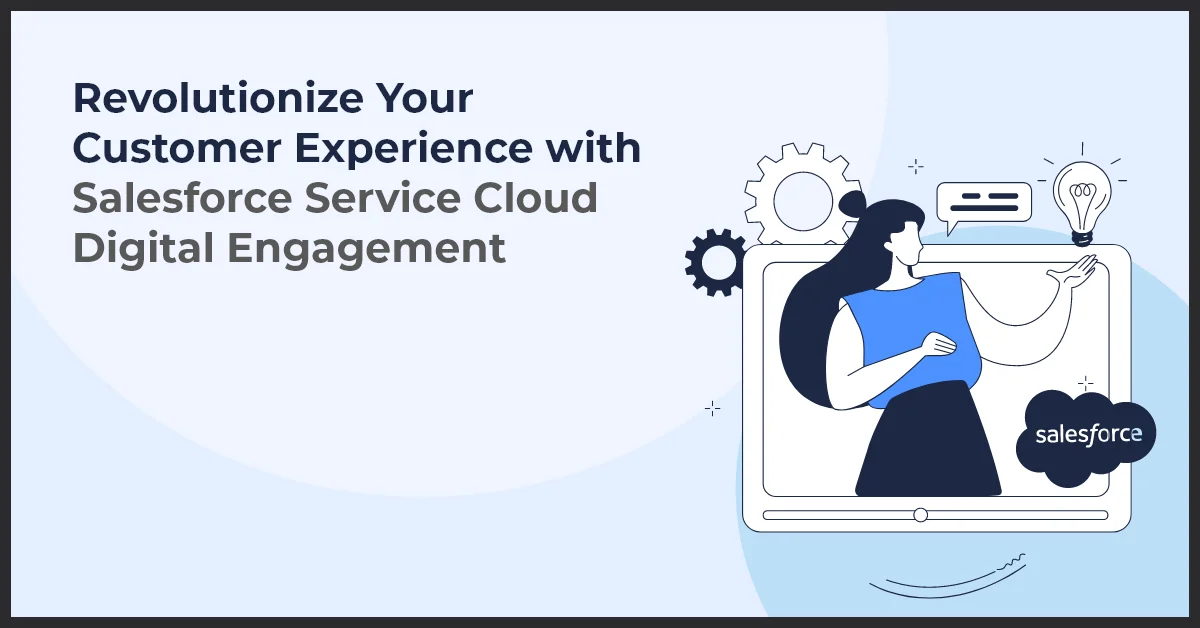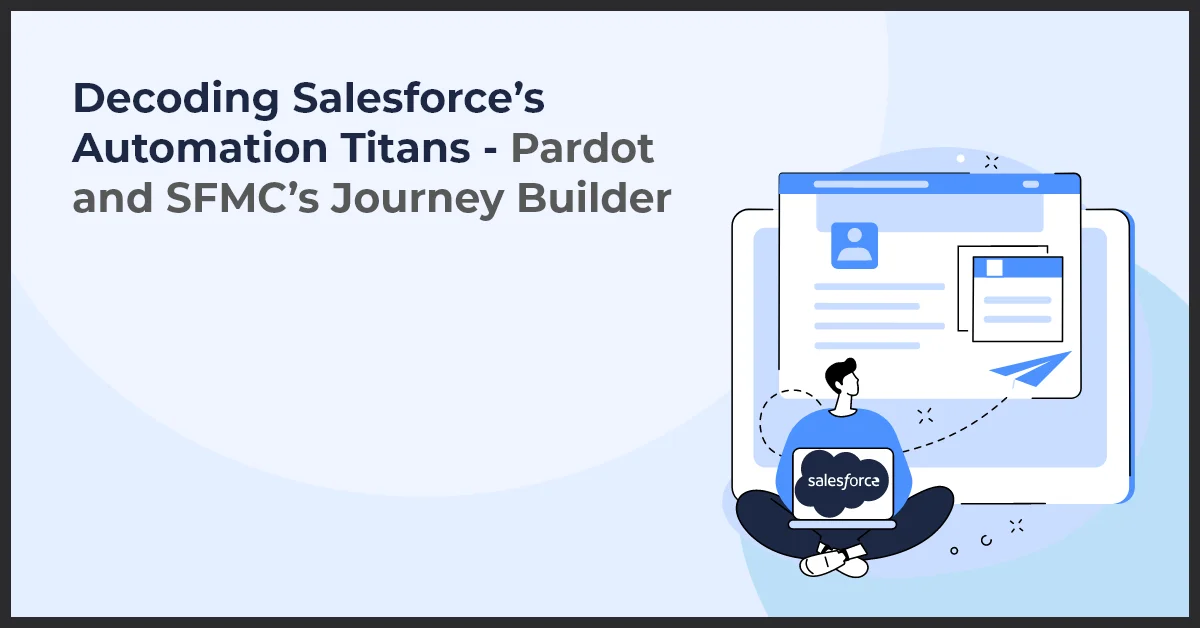Salesforce Loyalty Management: Driving Customer Satisfaction and Growth

Published on: January 14, 2021
Updated on: July 17, 2024
729 Views
- Salesforce
9 min read
"We see our customers as invited guests to a party, and we are the hosts. It's our job every day to make every important aspect of the customer experience a little bit better." - Jeff Bezos.
The founder of Amazon aptly put the importance of customer loyalty. After all, acquiring new customers can cost 5x or more than retaining them. Hence, the importance of customer loyalty in modern business is a crucial differentiator between success and failure.
We live in a customer-centric world where people have many choices, and technology is the driving force for retaining customers. Salesforce Loyalty Management has emerged as a powerful tool in this landscape.
First launched in 2021 for B2B and B2C enterprises, the Salesforce Loyalty Management service has witnessed constant improvement, allowing businesses to engage with customers meaningfully and earn their trust and patronage. What are the benefits of Salesforce Loyalty Management? How does it work? How can it drive customer satisfaction and growth? Let's discuss all these and more.
What Is Salesforce Loyalty Management?
Salesforce Loyalty Management is a comprehensive solution within the Salesforce ecosystem, allowing enterprises to harness and reward customer loyalty. Built on the Customer 360 Platform, Salesforce Loyalty Management enables organizations to set up and deliver a connected loyalty experience throughout a customer's journey. Enterprises can easily integrate it with Digital 360, Tableau, Service Cloud, and external systems using APIs.
Benefits Of Using Salesforce For Loyalty Management
Salesforce CRM's capabilities in managing customer data, sales, and marketing efforts are well known. It is the first-choice CRM tool for organizations across sizes and industries. Salesforce's loyalty management service is a force multiplier, customizable to fit any business's niche needs. It helps your customer loyalty management efforts in several ways, including:
- Increased customer loyalty and reduced churn
- Better customer engagement and increase in satisfaction
- Increase in Customer Lifetime Value
- Growth in business revenue
Why Customer Loyalty Matters For Businesses
A business sans customer loyalty is akin to a bucket with a hole. Irrespective of your sales and marketing team's efforts to attract new customers, churn will eventually hurt your bottom line. Loyal customers are a goldmine for any business as they are more likely to make repeat purchases, reducing the cost of customer acquisition. It results in a stable revenue stream, making your business less reliant on constantly attracting new customers.
When discussing customer loyalty, we can't overlook the importance of customer satisfaction. They share an interchangeable relationship – customer satisfaction leads to loyalty, and loyal customers are satisfied and more forgiving. In any business, loyalty extends beyond immediate financial gains. Loyal customers contribute significantly to your long-term growth and profitability by acting as brand advocates and, at the same time, influencing others to choose your brand.
What Does Salesforce Loyalty Management Bring to the Table?
Salesforce Loyalty Management packs all the bells and whistles you need to run and manage a successful customer loyalty program. Here are some of the key features that help you manage the program seamlessly:
- Customization - Salesforce Loyalty Management lets you tailor loyalty programs to match your customer base's unique needs and preferences. Whether you have a homogenous customer base or one that transcends different geographies and purchasing power parity, you can tailor the diverse program structures.
- Loyalty Tiers – You can easily define multiple loyalty tiers based on customer behavior and spending. With this, you can create unique rewards and benefits programs for different customer segments.
- Points and Rewards - Assign points to customers based on their actions, such as purchases or referrals redeemable for rewards or discounts. It allows you to incentivize customer engagement where they feel recognized and appreciated.
- Customer Segmentation - Harnessing customer data, Salesforce Loyalty Management facilitates customer segmentation by understanding their behavior and enhancing the overall effectiveness of loyalty programs.
- Personalized Offers – Customers have different needs and aspirations. Salesforce loyalty management lets you create personalized offers tailored to customer preferences and purchase history.
- Automation – The loyalty management solution has built-in automation capabilities, allowing you to automate various loyalty program processes, including enrollment, points calculation, and reward redemption.
- Gamification - Salesforce Loyalty Management lets you incorporate gamification elements into your loyalty programs, making them engaging and interactive for customers. It boosts active participation among your customers.
- Analytics - Leveraging data is crucial for refining loyalty programs. Salesforce's analytics and reporting offer valuable insights into customer behavior and program performance, letting you make data-driven decisions.
- Integration - Salesforce loyalty management seamlessly integrates with Sales Cloud and Service Cloud. You can also integrate it with other third-party platforms.
How To Implement Salesforce Loyalty Management
We have covered the benefits and features of Salesforce Loyalty Management. Here's a step-by-step process on how to implement this program:
Define The Goals for the Loyalty Program
Start by defining the goals of your loyalty program. Like other businesses, yours also has unique goals you aspire to achieve with the program. It is the most crucial step as you build a roadmap to implement the solution to meet your requirements.
Set The Loyalty Tier Groups
You will reward customers based on their loyalty and activity. In this step, you must define loyalty tier groups and how your customers will move through the tiers based on their activity. The more the members engage with the program, the more they will move up on the loyalty tiers and unlock exclusive benefits.
Enroll Members In The Loyalty Program
The success of your loyalty program depends on the active participation in the program. Once you have created a loyalty program, you must work hard to enroll customers through active marketing campaigns.
Ensure Data Accuracy
Ensuring accurate and up-to-date customer data is essential for effective program execution. Streamlines data management to ensure the program is constantly fed with correct and updated customer data.
Integrate Loyalty Management with Salesforce Clouds
In the next step, you must integrate the loyalty management services with other Salesforce Clouds, as it enhances loyalty initiatives. Identify cross-selling and upselling opportunities within Salesforce Cloud for better customer retention.
Test and Launch The Program
It is the last step in the process, where you must thoroughly test your program to ensure all configurations work as desired. Once you have achieved the desired outcomes during the testing stage, it is time to launch the program.
Driving Customer Satisfaction with Loyalty Management
Salesforce Loyalty Management helps businesses deliver personalized interactions and offers, creating a tailored experience for each customer. Streamlining the processes ensures a frictionless customer journey, further enhancing overall satisfaction. Let's now focus on how Salesforce helps achieve business growth through loyalty programs.
Increase Customer Retention And Lifetime Value
Salesforce Loyalty Management helps in increasing customer retention rates. You can retain your customers and maximize lifetime value by exploring strategies that nurture long-term customer relationships.
Expand Market Share And Attract New Customers
Loyalty programs help in expanding the market share and attracting new customers to the fold. In a competitive business landscape, attracting new customers is critical to survival and offsetting the usual churn.
Build Brand Advocacy
Satisfied and loyal customers are the most prominent brand ambassadors. They nurture organic growth and play a pivotal role through positive word-of-mouth and referrals.
Common Challenges That Come With Salesforce Loyalty Management
Implementing a Salesforce Loyalty Management program comes with its share of challenges. And being aware of them is the first step to equipping yourself to deal with them. Let us look at some common challenges and how to overcome them.
- Inaccurate Customer Data: It can limit the success of effective loyalty program management. To overcome this you must regularly update and clean customer data. Integrate Salesforce with other systems to ensure a comprehensive view of customer interactions.
- Lack of Personalization: Lack of personalized experiences reduces the effectiveness of your program. You must leverage Salesforce's customer segmentation and personalization features to tailor loyalty programs based on preferences and behaviors.
- Ineffective Communication: Poor communication hurts the uptake of your loyalty program, and you need to use Salesforce's marketing automation tools to send personalized messages, offers, and incentives to keep customers engaged.
- Integration Issues: Some businesses face issues integrating loyalty data with other systems, leading to disjointed customer experiences. Ensure seamless integration between Salesforce Loyalty Management and other platforms, allowing a unified view of customer interactions.
- Low Program Adoption: Customers may not feel motivated to join the loyalty program, resulting in low adoption rates. Implement a strong onboarding strategy and promote the loyalty program's benefits across various channels.
The Future of Salesforce Loyalty Management
Salesforce Loyalty Management has gained immense popularity over the last few years, and it promises more personalized and seamless customer experiences. In the future, we will see Salesforce leverage artificial intelligence and machine learning to analyze vast amounts of customer data in real time. Predictive analytics will play a pivotal role, enabling businesses to anticipate customer needs and preferences and offer tailored incentives and rewards.
Final Thoughts
In a marketplace where customer expectations are constantly evolving, Salesforce Loyalty Management stands out as a dynamic solution that not only meets but anticipates these demands.
By focusing on customer satisfaction and fostering genuine connections, businesses utilizing this platform are poised not only to retain their existing customer base but also to fuel sustainable growth through positive word-of-mouth and enhanced brand reputation. In essence, Salesforce Loyalty Management is a strategic asset for businesses looking to thrive in an era where customer loyalty is a cornerstone of success.
Want to Drive Better Customer Satisfaction With Salesforce Loyalty Management? Let’s Talk!
Our Salesforce-certified experts would love to help. Just write to us at info@growthnatives.com and we’ll get back to you.
Frequently Asked Questions
Salesforce loyalty program refers to the loyalty management capabilities within Salesforce’s CRM platform. It allows businesses to create and manage loyalty programs to reward and retain customers. The program enables businesses to track customer interactions, reward loyal customers, and analyze the effectiveness of their loyalty initiatives.
To enable loyalty management in Salesforce, you can use Salesforce Loyalty Management, a part of Salesforce’s suite of products. You would need to set up loyalty programs, define earning and redemption rules, configure member tiers, and integrate with other Salesforce tools for a seamless loyalty experience.
Loyalty management refers to the process of creating, managing, and optimizing loyalty programs to engage and retain customers. It involves identifying loyal customers, rewarding them for their loyalty, and providing incentives to encourage repeat business.
Loyalty programs in CRM are programs designed to reward and retain customers for their repeat business. These programs can include points-based systems, tiered memberships, exclusive offers, and personalized experiences. They aim to increase customer retention, drive customer engagement, and boost overall customer loyalty.



